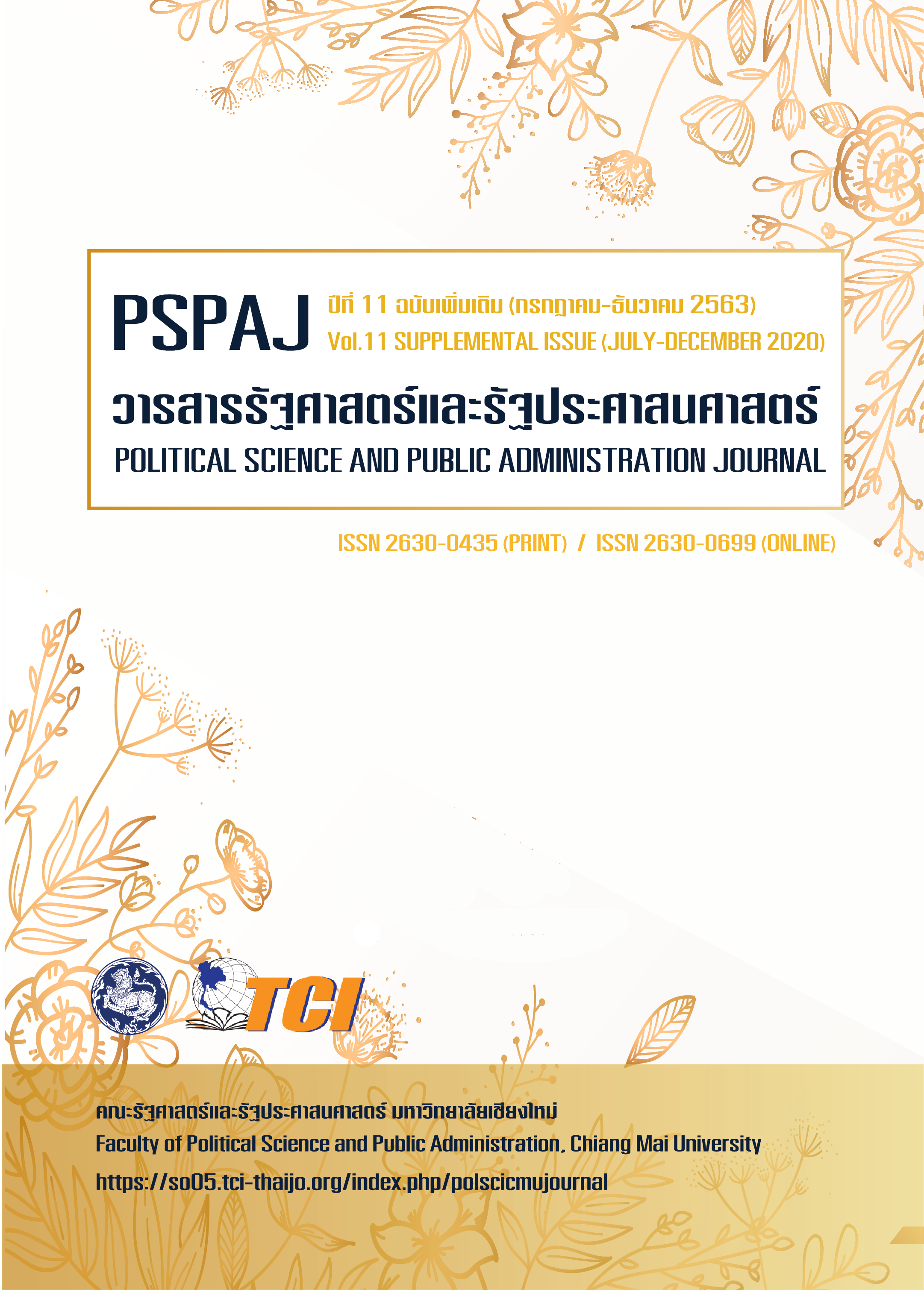The Rule of Authoritarianism and the Justice Problem Through the Life of Anan Phakprapai
Main Article Content
Abstract
This article presents the injustice issue of Thai state through the life of Anan Phakprapai who is the member of the house of representative of Phitsanulok province, and Deputy Minister of Agriculture and Cooperatives during the Kukrit Pramoj government in 1975. The article applies the rule of authoritarianism concept to explain the justice troubles which happened during the life of Anan. The major issue of Thai injustice found in the rule of authoritarianism which uses the court and judicial system as a political instrument to control society and political opponents. In the meantime, the Thai state use the laws and courts to justify their political legitimacy and impunity especially the military junta. This shows the judicialization of authoritarian politics that affected in political conflicts, human rights abuse and the state violence in Thai society. Meanwhile, the court and judicial system become the center of state-society contention, and it reflects the illegitimacy problem of Thai modern state.
Downloads
Article Details
- เนื้อหาและข้อมูลที่ลงตีพิมพ์ในวารสารรัฐศาสตร์และรัฐประศาสนศาสตร์ถือเป็นข้อคิดเห็นและความรับผิดชอบของผู้เขียนบทความโดยตรง ซึ่งกองบรรณาธิการวารสารรัฐศาสตร์และรัฐประศาสนศาสตร์ ไม่จำเป็นต้องเห็นด้วย หรือร่วมรับผิดชอบใดๆ
- บทความและข้อมูล ที่ได้รับการตีพิมพ์ในวารสารรัฐศาสตร์และรัฐประศาสนศาสตร์ ถือเป็นลิขสิทธิ์ของวารสาร หากบุคคลหรือหน่วยงานใดต้องการนำข้อมูลไปใช้ประโยชน์ในทางวิชาการ ขอให้อ้างอิงแหล่งที่มาด้วย
References
จำลอง ทองดี. (ม.ป.ป.). อุทัย พิมพ์ใจชน บนเส้นทางการเมืองที่ท้าทาย. กรุงเทพฯ: สถาบันพัฒนาผู้นำทางการเมือง.
ชาติชาย มุกสง. (2559). รัฐประหาร พ.ศ. 2514. สืบค้นเมื่อ 20 พฤษภาคม พ.ศ. 2563, จาก http://wiki.kpi.ac.th/index.php?title=รัฐประหาร_พ.ศ._2514
ไทยโพสต์. (2561, 24 พฤษภาคม). ความเหมือน และความแตกต่าง การเมืองยุคถนอมกับรัฐบาล คสช. สืบค้นเมื่อ 2 มีนาคม 2563, จาก https://www.thaipost.net/main/detail/9837.
ไทเรล ฮาเบอร์คอร์น. (2560). การปฏิวัติที่ถูกตัดตอน ชาวนา นักศึกษา กฎหมายและความรุนแรงในภาคเหนือของไทย. นนทบุรี: ฟ้าเดียวกัน.
ธงชัย วินิจกูล. (2563). นิติรัฐอภิสิทธิ์และราชนิติธรรม ประวัติศาสตร์ภูมิปัญญาของ Rule by Law แบบไทย. สืบค้นเมื่อ 2 มีนาคม 2563, จาก www.academia.edu/42188654/2020_2563_นิติรัฐอภิสิทธิ_และราชนิติธรรม_ประวัติศาสตร์ภูมิปัญญาของ_Rule_by_Law_แบบไทย
ธรรมนูญการปกครองราชอาณาจักร พุทธศักราช 2515. (2515, 15 ธันวาคม). ราชกิจจานุเบกษา. เล่ม 89 ตอนที่ 192 ฉบับพิเศษ. หน้า 1-12.
นรนิติ เศรษฐบุตร. (2559). 9 มีนาคม พ.ศ. 2515. สืบค้นเมื่อ 1 มีนาคม 2563, จาก http://wiki.kpi.ac.th/index.php?title=9_%E0%B8%A1%E0%B8%B5%E0%B8%99%E0%B8%B2%E0%B8%84%E0%B8%A1_%E0%B8%9E.%E0%B8%A8._2515
เบเนดิกต์ แอนเดอร์สัน. (2561). บ้านเมืองของเราลงแดง: แง่มุมทางสังคมและวัฒนธรรมของรัฐประหาร 6 ตุลาคม. ใน ชาญวิทย์ เกษตรศิริ, และธำรงศักดิ์ เพชรเลิศอนันต์ (บ.ก.). ตุลา-ตุลา สังคม-รัฐไทย กับความรุนแรงทางการเมือง (น.156-214). กรุงเทพฯ: มูลนิธิโครงการตำราสังคมศาสตร์และมนุษยศาสตร์.
ประกาศกระทรวงมหาดไทย เรื่องการจดทะเบียนพรรคการเมือง. (2518, 19 กันยายน). ราชกิจจานุเบกษาฉบับพิเศษ. เล่ม 92 ตอนที่ 193. หน้า 1-551.
ประจักษ์ ก้องกีรติ. (2548). และแล้วความเคลื่อนไหวก็ปรากฏ การเมืองวัฒนธรรมของนักศึกษาและปัญญาชนก่อน 14 ตุลา. กรุงเทพฯ: มหาวิทยาลัยธรรมศาสตร์.
______. (2558). พระราชหัตถเลขาสละราชย์ ร.7: ชีวประวัติของเอกสารฉบับหนึ่ง. ใน สรณ ขจรเดชกุล (บ.ก.). การเมืองวัฒนธรรมไทย ว่าด้วยความทรงจำ/วาทกรรม/อำนาจ (น. 57-68). นนทบุรี: ฟ้าเดียวกัน.
ป๋วย อึ้งภากรณ์. (2515). จดหมายจากนายเข้ม เย็นยิ่ง ถึงนายทำนุ เกียรติก้อง ผู้ใหญ่บ้านไทยเจริญ. สืบค้นเมื่อ 25 พฤษภาคม 2563, จาก http://puey-ungpakorn.org/index.php/archives?id=272
ปิยะบุตร แสงกนกกุล. (2559). ปิยบุตร แสงกนกกุล: ศาลไทยกับรัฐประหาร (1). สืบค้นเมื่อ 2 มีนาคม 2563, จาก https://www.matichonweekly.com/column/article_743
พระราชบัญญัติยกเลิกคำสั่งของหัวหน้าคณะปฏิวัติที่ 36/2515 ลงวันที่ 22 มิถุนายน พ.ศ. 2515 พ.ศ. 2517. (2517, 25 มกราคม). ราชกิจจานุเบกษาฉบับพิเศษ. เล่ม 91 ตอนที่ 11. หน้า 1-3.
พระราชบัญญัติให้ใช้ประมวลกฎหมายอาญา พ.ศ. 2499 หมวด 2 มาตรา 113. (2499, 15 พฤศจิกายน). ราชกิจจานุเบกษาฉบับพิเศษ. เล่ม 73 ตอนที่ 95. หน้า 1-114.
ศักรพร ถิรศิริกุล. (2549). กระบวนการกำหนดนโยบายปฏิรูปที่ดินของประเทศไทย: ศึกษากรณีกฎหมายปฏิรูปที่ดินเพื่อเกษตรกรรม. (วิทยานิพนธ์รัฐศาสตรดุษฎีบัณฑิต), จุฬาลงกรณ์มหาวิทยาลัย.
สมชาย ปรีชาศิลปกุล. (2539). ปัญหาทางกฎหมายบางประการเกี่ยวกับการปฏิวัติ. (วิทยานิพนธ์นิติศาสตรมหาบัณฑิต), มหาวิทยาลัยธรรมศาสตร์.
สำนักงานเลขาธิการสภาผู้แทนราฎร. (2518). คำแถลงนโยบายของรัฐบาล ในการประชุมสภาผู้แทนราษฎร ครั้งที่ 4/2518 (สามัญสมัยแรก) วันพุธที่ 19 มีนาคม 2518. สืบค้นเมื่อ 2 มีนาคม 2563, จาก https://library2.parliament.go.th/giventake/content_sp/sp36.pdf
สิริรัตน์ เรืองวงษ์วาร. (2539). ประวัติศาสตร์การเมืองไทยตั้งแต่เปลี่ยนแปลงการปกครอง พ.ศ. 2475 ถึงปัจจุบัน. กรุงเทพฯ: สำนักพิมพ์มหาวิทยาลัยรามคำแหง.
หนังสือที่ระลึกงานฌาปนกิจของคุณพ่ออรุณ ภักดิ์ประไพ. (2558). พิษณุโลก: หจก.สุรสีห์กราฟฟิค.
อนันต์ ภักดิ์ประไพ. (2532). นโยบายกับมติของคณะรัฐมนตรีไทย ระหว่าง พ.ศ. 2518-2523. (วิทยานิพนธ์รัฐศาสตรมหาบัณฑิต), จุฬาลงกรณ์มหาวิทยาลัย.
Haberkorn, T. (2011). Revolution Interrupted Farmers, Students, Law, and Violence in Northern Thailand. Wisconsin: University of Wisconsin Press.
______. (2018). In Plain Sight: Impunity and Human Rights in Thailand. Wisconsin, Madison: University of Wisconsin Press.
Moustafa, T. & Ginsburg, T. (2008). Introduction: The Functions of Courts in Authoritarian Politics. In Ginsburg, T. (Ed.). Rule by Law: The Politics of Courts in Authoritarian Regimes (pp. 1-22). New York: Cambridge University Press.


